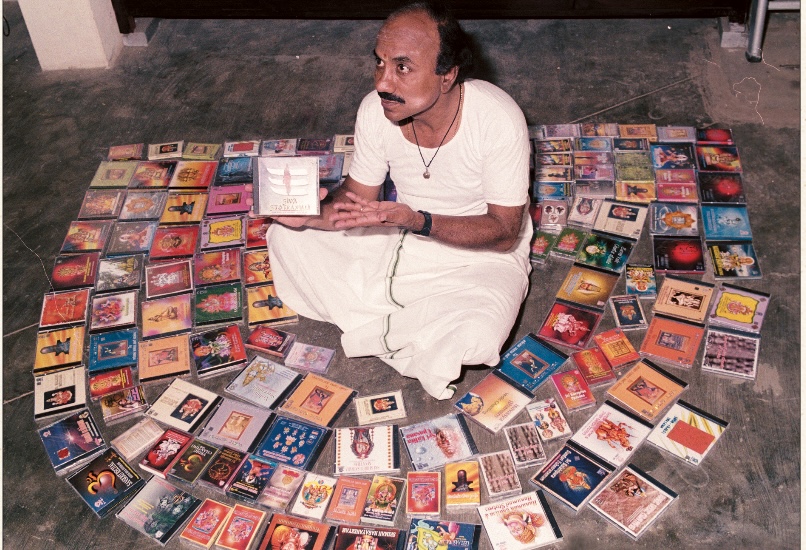BY KESAVA MALLIA
Chanting mantras brings peace and prosperity, power and great fortune. May the whole world become prosperous, ” says Dr. Rajagopalan Thiagarajan, a Vedic scholar who has taken the Hindu world by storm with his recordings of Sanskrit chanting of Vedic scripture.
His audio presentations–available on tape, CD and now on the Internet–feature chants in praise of many Hindu Deities, including Siva, Vishnu, Ganesha, Hanuman, Durga and Lakshmi. These recordings are distinguished because of their perfect diction, traditional presentation and state-of-the-art technical quality.
“The mantras should be tasted, ” says Dr. Thiagarajan, who has worked tirelessly for over 30 years to spread the knowledge of the Hindu scripture in India and around the world. “Every human being on Earth must know the beauty and the efficacy of these mantras. That is my mission. Sound is the link between man and God. Chanting mantras creates waves. The more times a mantra is chanted, the more power it generates. Our ancestors knew this scientific fact. Whenever they wanted to harness the power of God, they would chant. Of course, an intense love of God is also necessary, ” he says.
In less than two years, Dr. Thiagarajan has recorded approximately 120 CDs. Many of these recordings are rare, featuring extremely powerful mantras not often made available. He is also one of a handful of scholars who researched scripture on lesser known Deities, like Prathyankara, Shyaamala and Vaaraahi, to make them accessible to ordinary people. He attributes his current success in popularizing Sanskrit to his love of God and, not surprisingly, blessings derived from chanting Vedic mantras.
The scholar’s sacred Sanskrit recitals never fail to give prominence to a rich and varied selection of powerful prayers from the Vedas or Upanishads. These presentations always start in a very traditional way with the famous Gayatri Mantra, followed by a chant called the Sahasranamam. The only musical instrument he uses is the tambura (a simple stringed instrument), and this only to provide sruti (a drone sound furnishing a basic tonality).
Dr. Thiagarajan is the head of the Department of Sanskrit at Presidency College in Chennai, India. He is the youngest to be appointed to that position in the school’s 160-year-old history. The Sanskrit department is 125 years old.
Dr. Thiagarajan was born in a poor family in Injikkollai village in Tanjavur district of Tamilnadu. His father, D. Rajagopal, was a temple auditor, and his grandfather, Dasaratharama Sastry, was a respected Sanskrit scholar.
At an early age, Thyagu–as Dr. Thiagarajan was called then–worked for food at the local temple. He did sundry jobs like washing puja vessels and grinding sandalwood paste. While performing these simple chores around the temple, he was developing a deep and abiding love of God. The chanting of the priests particularly attracted him. Even at that young age, he was able to hear the subtleties of accent, tone and pause in the pronunciation of the mantras.
Gradually, Thyagu was overcome with a desire to learn the proper chanting of these holy mantras, but was forced to face numerous challenges in his efforts to do so. His will was strong, however, and his faith in God was firm. At every turn along the way, mentors were there, provided–it seemed–by divine intervention.
A priest named Vedamoorthy Sastry was Dr. Thiagarajan’s first Sanskrit teacher. When little Thyagu was only ten, Vedamoorthy taught him to chant complex Vedic scriptures. Another priest, Kunjithapadam, taught him to perform puja (Hindu ritual).
Thiagarajan never had an opportunity to formally learn Sanskrit in a traditional padasala (a training center for young priests), but with what he learned on his own and from a handful of compassionate private teachers, he was able to get a masters and doctoral degree in Sanskrit from Madras University. One of his professors, Viswanathan, who also served as a priest at the local Kapaleeswaran temple in Chennai, got him scholarships, food and accommodations. Thyagu lived at the Ramakrishna Mission Students’ Home, an orphanage in Chennai, for five years until he completed his college education. Swami Thathagathananda, then head of the Ramakrishna Mutt, encouraged Thyagu to join debates, elocution and recitation competitions and groomed him for leadership roles. Rajagopal, one of Thyagu’s university teachers, further kindled his interest by inspiring him to participate in research work being done at that time on the history of Sanskrit.
Today, Thiagarajan is closely associated with all of the eight universities in South India. The Tamil Nadu Government has nominated him as a trustee for two Chennai-based foundations actively involved in promoting Sanskrit: The Rao Bahadur Ranganatham Chetty Charitiable Trust and the Maduranthakam Sanskrit College Trust.
Dr. Thiagarajan uses films to propagate Sanskrit chanting. He composed the title song for the film Baba starring Rajni Kant, the highest-paid film actor in Tamil Nadu, and chose a sloka from the Devi Mahatmayam for the movie Hey Ram, starring Kamala Hasan, another popular film star. For another film, he chose a sweet rendition of Manmatha Gayatri (a prayer to the God of Love).
If all of this is not enough. Thiagarajan also teaches Sanskrit online. His articles on Sanskrit can be read at www.southindianmusic.net. He has delivered more than 800 lectures in India, 108 Sanskrit programs on Doordarshan (the national T.V. channel in India) and over 100 Sanskrit programs for All India Radio. He has written numerous dramas, articles and textbooks in Sanskrit and Tamil, and is the Sanskrit book reviewer for The Hindu, a national newspaper in India. He also founded the Fellowship of Sanskrit Culture, to promote Sanskrit. Its headquarters is in Chennai, India.
Dr. Thiagarajan is doing more than his part in helping to revive the ancient art of Vedic chanting. While many of his scholarly peers bring integrity and expertise to the effort, his contribution is plenty of that plus zest and zeal. As one student said: “Dr. Thiagarajan makes you want to learn Sanskrit.” For more information about this fascinating man and his work contact visvasanti@hotmail.com.”
With Laksmi Kantam in Chennai


